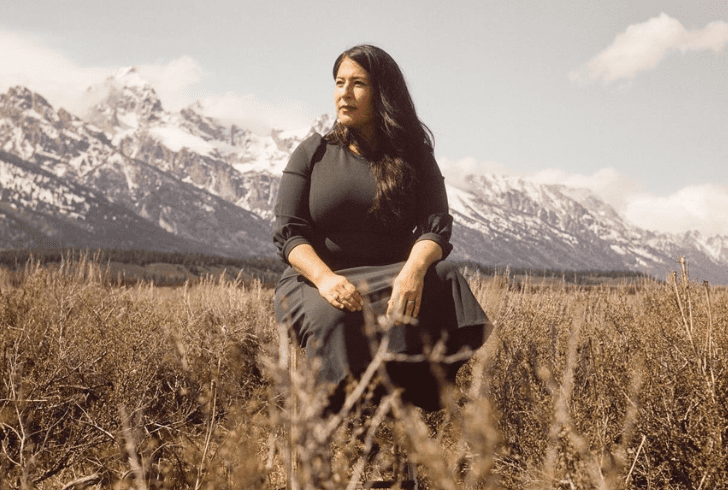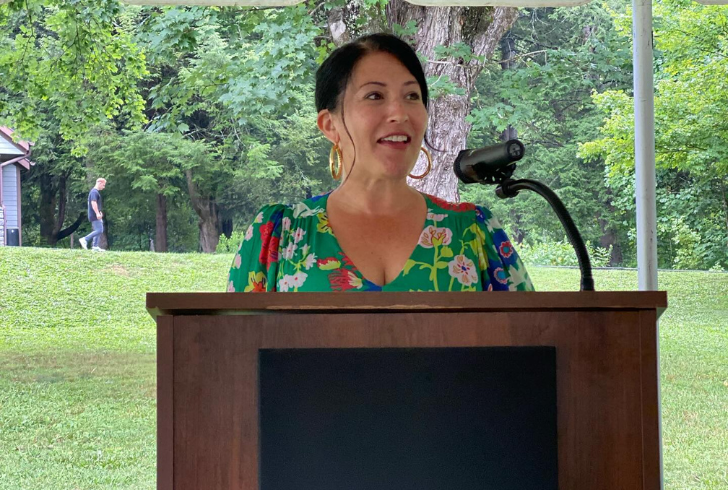In a remarkable fusion of art and science, U.S. Poet Laureate Ada Limón has ventured beyond the earthly realm, not just in a literal sense, but through the imaginative power of her poetry. As she prepared for the launch of the Europa Clipper spacecraft, Limón crafted a poem that speaks volumes about humanity’s connection to our home planet, Earth, while reaching out to the mysterious expanses of space.
Her poem, “In Praise of Mystery,” is engraved on the spacecraft, sending a message of wonder that encapsulates our curiosity for the cosmos and our reverence for our own world.
The Journey to Create
When asked to write a poem for such a monumental event, Limón experienced a mix of excitement and trepidation. Known for her deep connection to nature and her fascination with the universe, she initially hesitated, fearing the constraints of crafting an “occasional poem” tied to a specific mission. Her mind danced between the grandeur of outer space and the profound beauty of Earth.
She candidly shared her thought process, acknowledging the complexity of poetry: “I find it challenging to create a piece with a singular focus. Poems, for me, must weave layers of meaning, not simply convey facts.” This realization led her to embrace her core themes of interconnectedness and the intrinsic value of our planet.

Instagram | adalimonwrite | Ada Limón found inspiration in both the cosmic quest for Europa and Earth's earthly wonders.
Ada Limón drew inspiration not only from the scientific pursuit of exploring Europa, one of Jupiter's moons believed to harbor an ocean beneath its icy crust, but also from her love for Earth. The mission, after all, was as much about understanding our universe as it was about recognizing the preciousness of the home we inhabit.
Crafting the Message
The creative process was no small feat for Limón. The poet worked tirelessly, producing draft after draft, refining her thoughts and feelings into a cohesive expression of wonder. “The more I wrote, the more I realized that the poem had to resonate with my own experiences,” she noted. With the serene backdrop of W.S. Merwin’s palm forest retreat in Maui, she sought to merge her personal narrative with the universal, ultimately settling on a message that reflects the shared human experience.
Limón's poem encapsulates the essence of human curiosity and our collective yearning for understanding. As she wrote, she began to view the task not merely as an assignment but as an opportunity to give voice to the interconnectedness of all life. “The poem became a collective effort,” she explained. “I was no longer just speaking for myself but for all beings on this planet, celebrating our shared existence.”
An Exploration of Connection
Limón’s poem, directed at the celestial body of Europa, poignantly reminds us of our responsibility to care for Earth. She emphasizes this connection in her verses, invoking the beauty of nature and the small wonders that surround us daily. The juxtaposition of earthly imagery with cosmic exploration invites readers to reflect on their place in the universe and the significance of protecting our planet.
The poet's perspective shines through her lines, where she celebrates the commonalities that bind us to our world: “We are composed of the same elements that fill the cosmos. Just as Europa is a world of water, so too are we.” This line highlights the universality of existence, underscoring that our connections extend far beyond the surface of our planet.
Life as a Poet Laureate
When reflecting on her role as U.S. Poet Laureate, Ada Limón describes a life filled with travel, outreach, and inspiration. Engaging with communities across the country, she aims to highlight the vital work being done to preserve poetry and the arts. “Witnessing the dedication of artists and activists has been humbling,” she remarked, recognizing the collective efforts to ensure poetry remains a vital part of cultural discourse.
In her initiative “You Are Here: Poetry In Parks,” Limón has brought poetry into nature, encouraging people to explore the beauty of their surroundings while connecting through verse. This outreach emphasizes her belief in poetry as a tool for connection, helping individuals find solace and strength in shared experiences.
Reflections on Poetry's Role in Society

Instagram | adalimonwriter | Ada Limón believes poetry is a private, personal tool for self-understanding.
As Ada Limón delves deeper into her craft and role in society, her views on poetry have evolved. She now sees poetry not just as something to be shared publicly but as a deeply personal experience that can resonate with individuals. “Private poems carry immense power,” she asserts. “They may never be seen by the world, but they serve as an intimate connection to our thoughts and emotions.”
This shift highlights the potential for poetry to foster self-awareness and empathy, illustrating how writing can bridge gaps between ourselves and the world around us. In a time when many feel isolated, poetry provides a means of connection, reminding us that we are never truly alone.
Celebrating Earth and the Universe
Ultimately, Limón's work reflects a profound love for both Earth and the mysteries of the universe. Her poem, while an ode to the exploration of Europa, also serves as a call to action to cherish and protect our home. The urgency in her message resonates in a world facing environmental challenges, urging us to appreciate the wonders of nature before they slip away.
Through her lyrical exploration, Ada Limón encapsulates the beauty and complexity of our existence, inviting us all to contemplate our place in the cosmos and the preciousness of life on Earth. In her words, we find a celebration of not only the stars above but also the intricate tapestry of life that surrounds us daily.
A Poetic Legacy
As the Europa Clipper embarks on its journey, carrying Limón’s evocative words, we are reminded of the endless possibilities that lie ahead. The intersection of art and science creates a rich landscape for exploration and discovery, revealing the profound connections between humanity and the universe. Ada Limón’s poetry inspires us to look both outward and inward, fostering a sense of wonder that is essential in our shared journey through life.
In a world that often feels chaotic, her work encourages us to pause, reflect, and appreciate the beauty in both the grand and the mundane. As we continue to explore the cosmos, let us also commit to honoring and protecting the only home we have ever known.